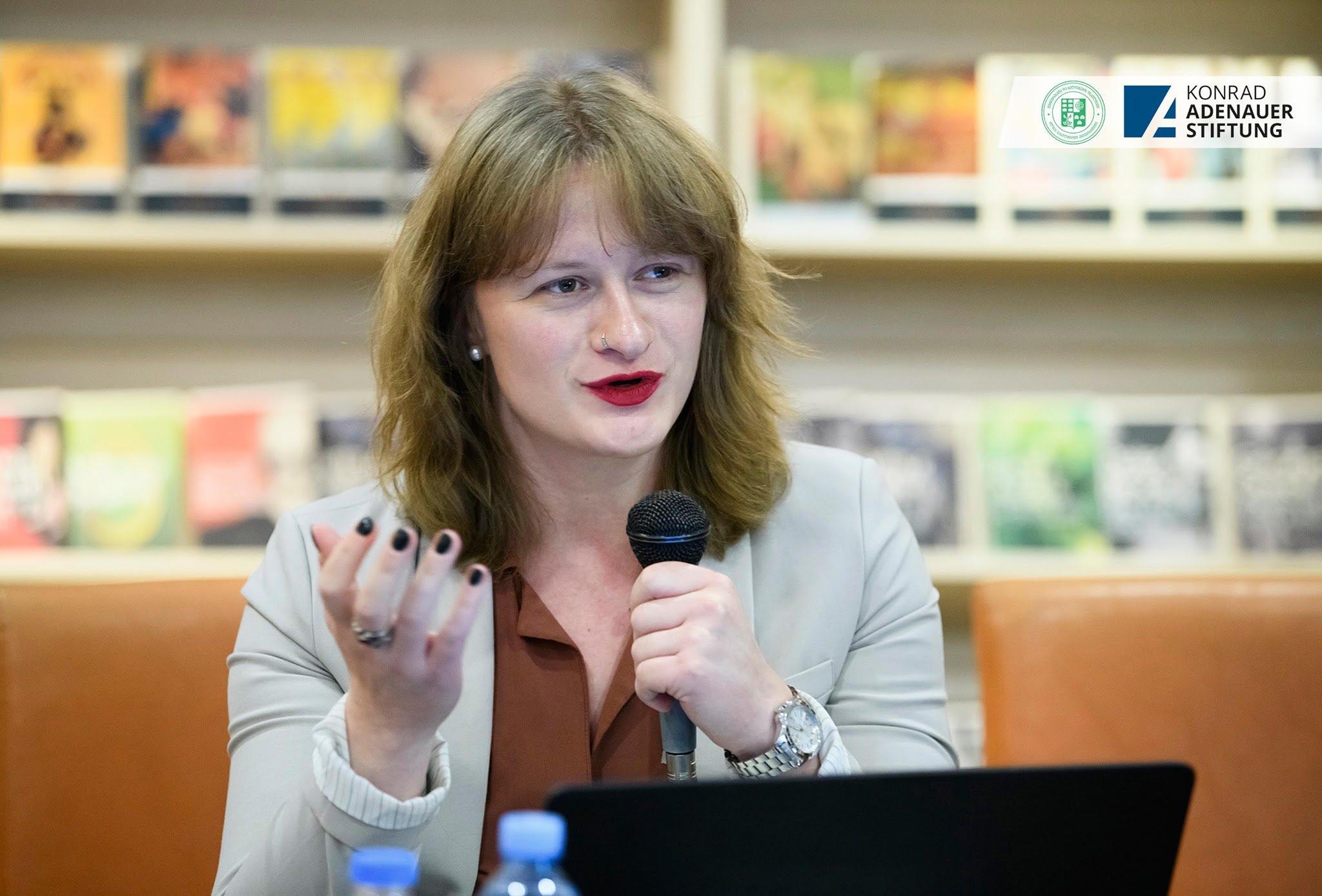Kristine Margvelashvili

Academic Biography:
- Bachelor’s Degree: Social Sciences (International Relations), Ivane Javakhishvili Tbilisi State University, 2011
- Master’s Degree: Black Sea Studies (Political Science), International Hellenic University (Thessaloniki, Greece), 2013
- PhD exchange: Catholic University of Louvain (UCL). Research Institute on Religions, Spiritualities, Cultures, Societies. University of Glasgow (UofG) Centre for Russian, Central and East European Studies Exchange PhD student, Under Erasmus+ scholarship Duration: 13/02/2018 – 31/07/2018
- Scientific position(s):
- Teaching Assistant _ Nationalism and Modern Politics. Ilia State University. Professor-Ghia Nodia. Faculty of Arts and Sciences Spring sem. 2019/2020- Spring sem. 2020/2021
- Teaching Assistant _Comparative Party Politics. Ivane Javakhishvili Tbilisi State University. Associate Professor-Korneli Kakachia. Faculty of Social and Political Sciences. Fall sem. 2016/2017
- Junior Research Fellow at the Centre for Social Sciences (CSS). Tbilisi, Georgia. 2014-2017.
- Researcher at Caucasus institute for Peace, Democracy and Development (CIPDD). Tbilisi, Georgia. Research project “Religion, Society and Politics in Georgia”. Funded By: Academic Swiss Caucasus Network (ASCN). 2015 - 2016.
- Research Assistant at International Center for Black Sea Studies (ICBSS). Athens, Greece. Under the Erasmus Mundus professional traineeship program. 2012 - 2013
Brief Description of the Doctoral Project:
“Desecularization in Orthodox Europe: Nationalism and the Role of Religion in political Processes”
The study aims to inquire upon the desecularization process in Georgia, while comparing it to Greek case, and shaping narrative around Eastern European region. Doctoral project will try to find out what the role of the church is as a powerful social institution in the election processes and election results and in what kind of relationship church is with other social or political institutions. Due to the nationalistic character of Orthodox Churches, we are also looking at religious nationalism and its role in political transformation process of the region.
Research hypothesis of the project is as follows: Church’s influence on internal politics or foreign policy of Orthodox European countries (Georgia, Greece) is conditioned not by the failure of (soviet) modernization process but rather with the accommodating characteristics of Orthodoxy and power of Byzantine concept of Symphonia, the political and theological tradition, according to which church and state collaborate to achieve mutual goals and thus strengthen each other.
Research is qualitative by its nature. In-depth interviews will be conducted with experts, political elite and church representatives in each country. Additionally secondary qualitative databases will be used. Time frame is from dissolution of Soviet Union up until 2016 year.
Publications:
- Book Review: Orthodox Christianity and the Politics of Transition: Ukraine, Serbia and Georgia. By Tornike Metreveli. Journal of Church and State. Volume 64, Issue 2, Spring 2022, Pages 343–345. Oxford University Press. March 9, 2022. https://doi.org/10.1093/jcs/csac012
- Role of Religion and Nationalism in Stateness: Case of Georgia. In ‘Visible and Invisible Religion: Cultural and Political dimension of religious issues in Georgia’. Pg. 65-89. Ilia State University Press, Tbilisi. 2021. ISBN 978-9941-18-363-8 (In Georgian)
- “Role of the Orthodox Church in Georgia’s European Integration process” Caucasus Social Science Review (CSSR), Vol 4 (2018). http://openjournals.gela.org.ge/index.php/CSSR/article/view/2520
- Religion, Society and Politics. “Church’s Influence: Political Processes and Election in Georgia.” Pg 4-15. The Caucasus Institute for Peace, Democracy and Development. 2016. ISBN 978-99928-37-46-7 (in Georgian) http://www.cipdd.org/upload/files/religion%20society%20and%20politics%20in%20Georgia.pdf
Conference Participations, Scientific Talks, Poster Presentations:
- International workshop: ‘Voters and political parties in post-Communist Europe: new challenges and opportunities.’ Presented paper: Political participation in post-communist Europe: The Orthodox Church, Voters, and political parties. 19-21 September 2018, Södertörn University, Stockholm, Sweden.
- European Consortium for Political Research (ECPR) General Conference 2019. Section: Religion and Politics in a Secular Age: Patterns, Dynamics and Consequences. Paper: Desecularization in Orthodox Europe: Causes and Consequences. 4-7 September 2019, Wroclaw, Poland.
- “Christian Identity in National, Transnational and Local Space. Perspectives from Protestantism, Orthodoxy and Roman Catholicism”. University of Oxford, Blavatnik School of Government. Paper: ‘Unholy Alliances in Orthodox Christianity: comparing Greece and Georgia’ 4-5 April, 2022
- “Are religious worldviews still relevant to democracy today? Anglo-American, Dutch, and German perspectives”. University of Cambridge, Faculty of Divinity. Paper: ‘Orthodox Europe and democracy: identity formation and symphonic traditions’. 16-17 June, 2022.
Grants (own Grants and Participation in Grants):
- Grant by Open Society Foundations Think Tank Fund, Young Professional development program. Individual grant holder/researcher. “Religion, Society and Politics in Georgia”. Caucasus institute for Peace, Democracy and Development (CIPDD). Tbilisi, Georgia. From 11/2015 to 04/2016.
- Shota Rustaveli National Science Foundation of Georgia. Grant for the PhD project: "The Role of Religion in Political Transformation process: The case of Georgia and Greece.". 10/2022-04/2023
Contact Information: